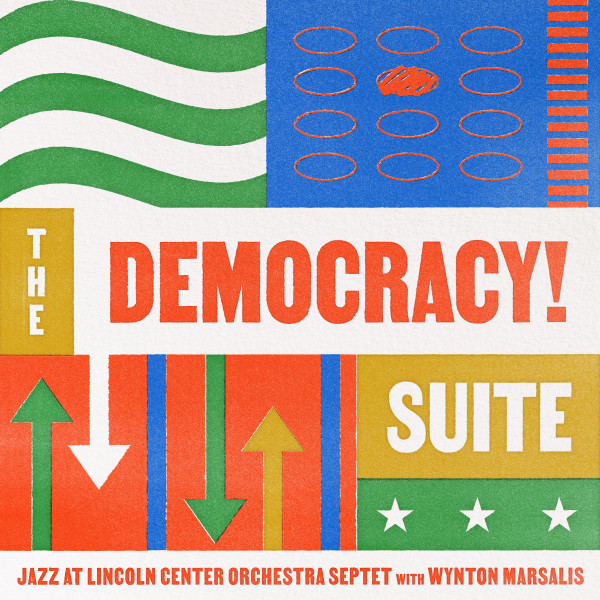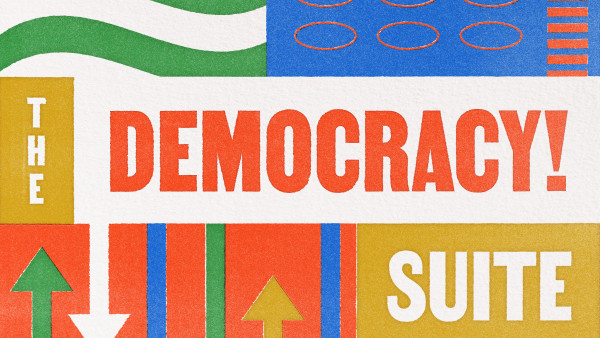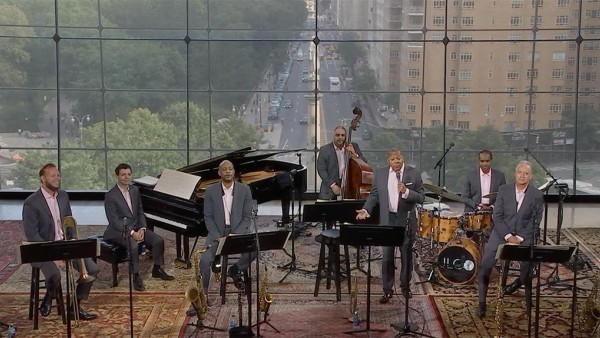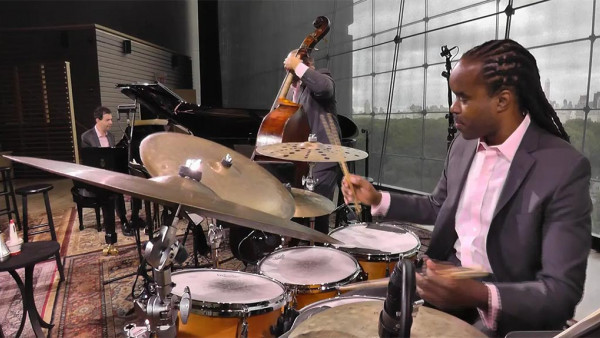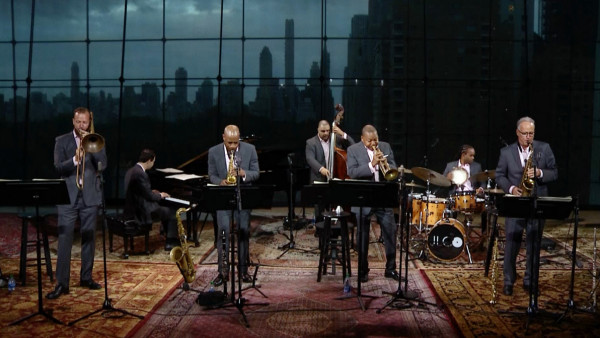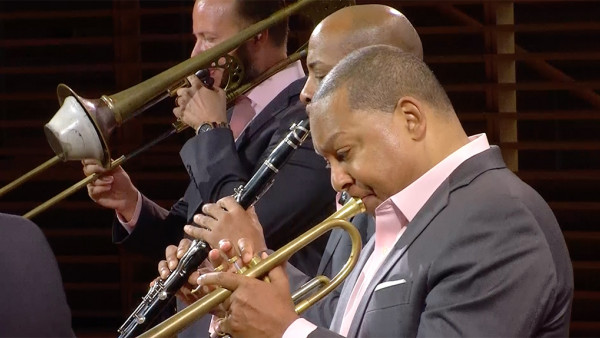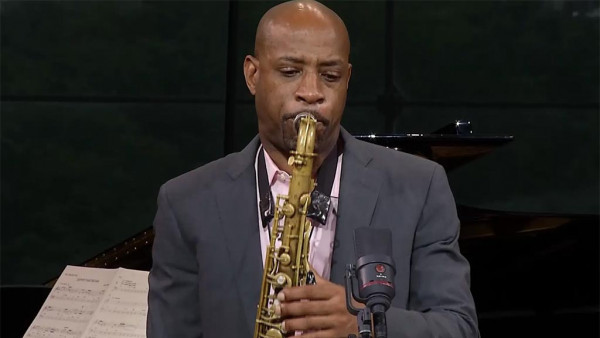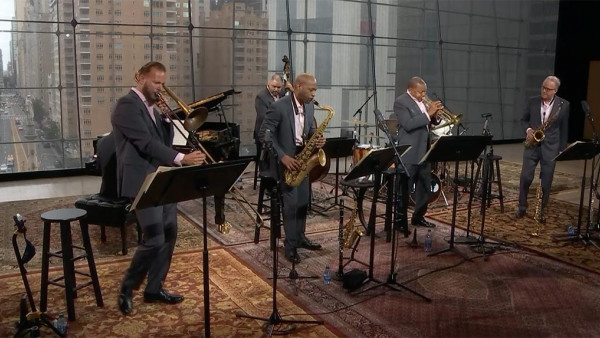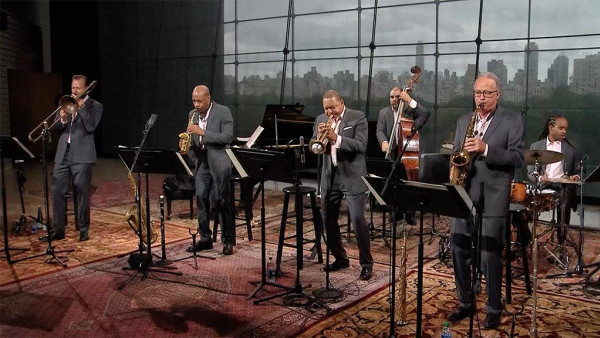Review: Jazz At Lincoln Center Orchestra Septet With Wynton Marsalis: The Democracy! Suite
There is an interesting generational divide in perception when it comes to the music of . While many hail his work at Lincoln Center as elevating jazz to its rightful place among the fine arts, others lament the separation from his iconic quartet and quintet work in the 1980’s as some sort of jazz treason.
What is unquestionable is his virtuosity and eloquence, expressing each note with beauty as the clear priority in his playing as a trumpeter, and his role as a bandleader. In some ways, his work with the at large, and the septet within, provides him with a musical bully pulpit from which to dynamically speak the language of jazz to ears that would otherwise be listening elsewhere. He has continually reminded us of the strength of unity, of the beauty and power of divergent cultural contributions to the fabric of American life, expressed through its most original art form. With his latest digital septet release, , Marsalis offers eight compositions that aim to express the realities of our current global situation, the fight for social and racial justice, and the assault on our democracy that has hallmarked the past year in America.
The opener, “Be Present,” is inspired by those workers on the front line during the pandemic, whether by choice or necessity. It as well recognizes all who have fought for social justice in the midst of this global tragedy. As is generally the standard for Marsalis’ work, the playing is sublime, but there is clearly an emotive element to the playing here, and throughout the album, that brings to light Marsalis’ most important compositional work in quite some time. The music is fresh, shaking off the rust of the epic year of 2020, and briskly charging forward with a collection of well inspired voices.
“Ballot Box Bounce,” is a lively, swinging ode to the foundational premise of democracy, the vote. While one party works hard to get out the vote, and the other claims voter fraud, this piece bounces merrily along despite the shenanigans. Marsalis points out with this piece that prohibition created more drinkers, as efforts to disenfranchise voters lead to more voters. Ted Nash adds a light touch to the joyous melody on flute, while drummer Obed Calvaire pushes the piece forward with his deft brushwork. Bassist Carlos Henriquez works hand-in-hand with Calvaire with elegant fluency, as is the case from top to bottom of these eight tunes.
Whether we are experiencing actual change, or just another setback and recovery is examined with a piece inspired by a line often used to answer that very question. Elders in our community may remark, “I remember when so and so happened—and it came ‘round ‘gin.” Marsalis’ elegant melody is expressed beautifully by this stellar front line—tenor saxophonist Walter Blanding, altoist Ted Nash, trombonist Elliot Mason, and of course, Marsalis himself. Pianist Dan Nimmer is in a sense the unsung hero of the record, mostly laying down stylish voicings to augment the work of his bandmates, yet offering tasteful, decorous solos of his own.
“That’s When All Will See” features Marsalis reaching deep into his New Orleans roots, speaking to how tribes come together in times of tragedy. As was the casewith 9/11 and Katrina in modern times, the global pandemic illustrates in broad terms that we are all deeply connected in a very real way. Our actions clearly impact all of humanity.
As jazz music has evolved over a century of time, there are certain characteristics that are communicated in spite of even the most tidal musical shifts. For example, collective improvisation is employed in Dixieland music, as well as the modal collectivism of free jazz. Just as the institutions of our democracy have stood the test of time across generations and cultural shifts, jazz has always illustrated the struggle of the American people and their quest to perfect its democracy in terms of justice for all. America’s truest and most original art form can best express the American condition, in this case, everything we as a global community have experienced in 2020. Jazz is, and always has been, democracy in action. With The Democracy! Suite Marsalis and this superb septet present a clear, emotive snapshot of just that.
by Paul Rauch
Source: All About Jazz

